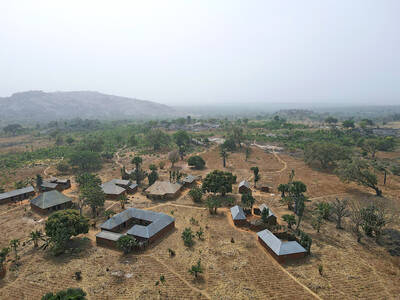A team of scientists in the Philippines has launched an ambitious project to alter the way rice grows and greatly increase yields of the crop, a daily staple for almost half the world’s people.
With prices soaring and population increasing, experts say increasing the yield — the amount of rice that can be produced from a fixed amount of land — will be crucial to feeding the planet’s poor in the years to come.
“This is a long-term, complex project that will take a decade or more to complete,” said John Sheehy, the scientist leading the work at the International Rice Research Institute (IRRI).
“The result of this strategic research has the potential to benefit billions of poor people,” he said.
Sheehy said up to 50 percent more rice could be produced, while using less water and fertilizer, by altering the way the plant turns sunlight into the energy it needs to grow.
Rice uses a relatively inefficient form of photosynthesis, the process of turning light into the “fuel” for growth, known as C3.
Sheehy’s team hopes to turn rice into a plant that uses the C4 variety of photosynthesis, like that of maize and sorghum, which is 50 percent more efficient.
That would mean more rice grown with fewer resources — which would help to ease the soaring price of the crop, selling last year for more than US$1,000 per tonne.
“The benefits of such an improvement in the face of increasing world population, increasing food prices, and decreasing natural resources would be immense,” Sheehy said.
The IRRI was instrumental in developing the modern variety of high-yield rice in Asia in the 1960s, credited with keeping countless numbers alive and providing the foundation for the region’s economic transformation.
Now it says yields will have to be increased again in the face of rising prices, less available water and land, and the growing number of mouths to feed around the world.
It plans to use “modern molecular tools” to develop a more efficient and higher-yielding form of rice.
The institute said the project involves molecular biologists, geneticists, physiologists, biochemists and mathematicians, and that it has received a grant of US$11 million from the Bill and Melinda Gates Foundation.

‘TERRORIST ATTACK’: The convoy of Brigadier General Hamdi Shukri resulted in the ‘martyrdom of five of our armed forces,’ the Presidential Leadership Council said A blast targeting the convoy of a Saudi Arabian-backed armed group killed five in Yemen’s southern city of Aden and injured the commander of the government-allied unit, officials said on Wednesday. “The treacherous terrorist attack targeting the convoy of Brigadier General Hamdi Shukri, commander of the Second Giants Brigade, resulted in the martyrdom of five of our armed forces heroes and the injury of three others,” Yemen’s Saudi Arabia-backed Presidential Leadership Council said in a statement published by Yemeni news agency Saba. A security source told reporters that a car bomb on the side of the road in the Ja’awla area in

‘SHOCK TACTIC’: The dismissal of Yang mirrors past cases such as Jang Song-thaek, Kim’s uncle, who was executed after being accused of plotting to overthrow his nephew North Korean leader Kim Jong-un has fired his vice premier, compared him to a goat and railed against “incompetent” officials, state media reported yesterday, in a rare and very public broadside against apparatchiks at the opening of a critical factory. Vice Premier Yang Sung-ho was sacked “on the spot,” the state-run Korean Central News Agency said, in a speech in which Kim attacked “irresponsible, rude and incompetent leading officials.” “Please, comrade vice premier, resign by yourself when you can do it on your own before it is too late,” Kim reportedly said. “He is ineligible for an important duty. Put simply, it was

Syrian President Ahmed al-Sharaa on Sunday announced a deal with the chief of Kurdish-led forces that includes a ceasefire, after government troops advanced across Kurdish-held areas of the country’s north and east. Syrian Kurdish leader Mazloum Abdi said he had agreed to the deal to avoid a broader war. He made the decision after deadly clashes in the Syrian city of Raqa on Sunday between Kurdish-led forces and local fighters loyal to Damascus, and fighting this month between the Kurds and government forces. The agreement would also see the Kurdish administration and forces integrate into the state after months of stalled negotiations on

CHURCH ABDUCTIONS: Remarks by police and other officials were ‘intended to prevent unnecessary panic while facts were being confirmed,’ a spokesman said Nigerian police on Tuesday made an about-turn, saying that gunmen had abducted dozens of people during Sunday mass in northern Kaduna State after dismissing the initial reports. A senior Christian clergy and a village head had on Monday told reporters that more than 160 people were snatched from several churches on Sunday. A security report prepared for the UN said that more than 100 people had been kidnapped at multiple churches. The chief of police of Kaduna State and two senior government officials had initially issued denials, saying security officers had visited the scene of the alleged crimes and found no proof of